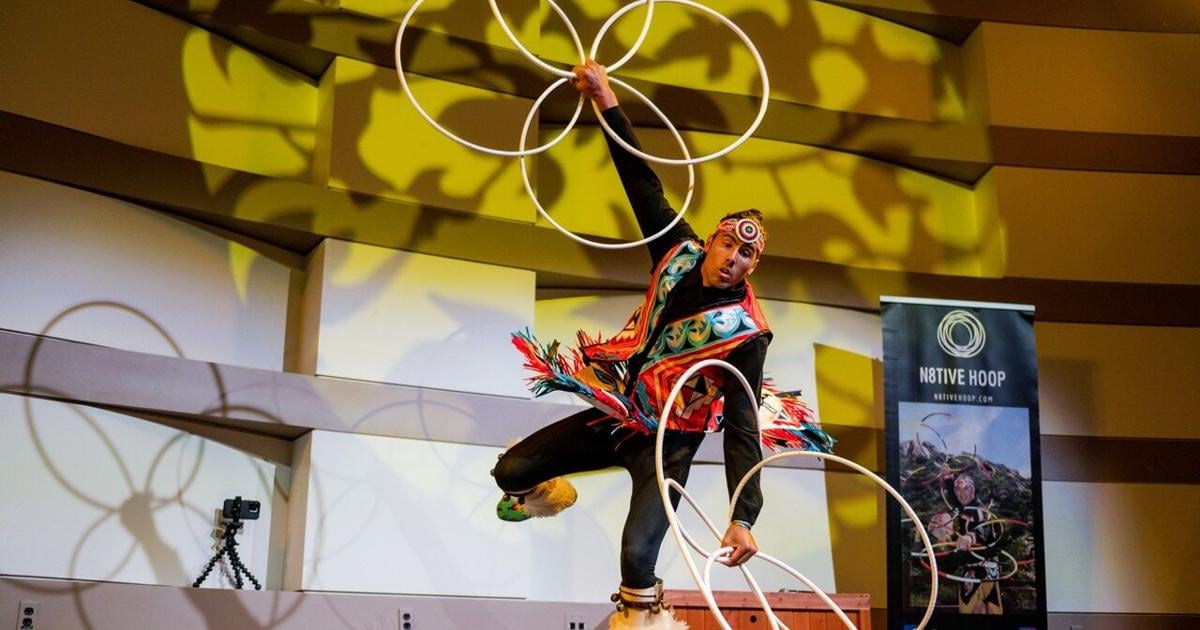
Skirball Cultural Center’s Magnin Auditorium will host this year’s “Voice of Heritage: Celebrating Indigenous and Jewish Languages and Cultures” in a one-day event from 11:30 a.m. to 5:30 p.m. on Nov. 17. Families can participate in activities and games and enjoy poetry, music, art and performances in an intergenerational daylong festival.
Guests are also encouraged to view Skirball’s exhibition “On the Native Language: The Poetry of America’s Endangered Tongues,” which features 46 portraits of current U.S. students and speakers of endangered languages.
“This is a first-time all-day event that is being programmed by Skirball Cultural Center in conjunction at the center about Native language,” said Marlene Braga, Skirball Cultural Center vice president of public programs.
“This is an event that we hope can be an outlet to all who join us, and we hope it can become an annual tradition. Our small but mighty programs team wanted to create an event that added more and more layers of stories to provide answers and help the understanding of what exists deeper in history. Endangered tongues, the poetry of language, and the connection of storytelling and languages kept alive is certainly something to celebrate.”
Panels will be from 12:30 to 5:30 p.m., with three discussions from speakers, including artist B.A. Van Sise, scholar Ilan Stavans and columnist Gustavo Arellano.
About the speakers
Van Sise is a photographic artist and linguist who explores the intersection of language and visual arts. His work has been featured in prominent exhibitions, including at the Center for Creative Photography in Tucson, the Woody Guthrie Center in Tulsa, the Peabody Essex Museum in Salem, the Los Angeles Center of Photography and the Whitney Museum of American Art in New York. Van Sise’s short nonfiction and poetry have also appeared in Poets & Writers, Rattle, the North American Review and the Los Angeles Review. He is fluent or conversant in English, Ladino, Italian, French, German and Russian.
Stavans is the Lewis-Sebring Professor of Humanities, Latin American and Latino Culture at Amherst College, and serves as the publisher of Restless Books.
Gustavo Arellano, an LA Times columnist, authored “Taco USA: How Mexican Food Conquered America.” Arellano is the son of Mexican immigrants, one of whom arrived in the United States in the trunk of a Chevy.
Voices of Heritage performances and events
World champion hoop dancer Terry L. Goedel and his family will bring Yakama and Tulalip stories to life through the art, sport and ceremony in “N8tive Hoop” from 3 to 3:45 p.m. in the Taper Courtyard. This performance will highlight Indigenous peoples’ rich traditions and allow its audience to learn more about community organizations to help support the Indigenous communities along with endangered languages.
From 3:30 to 4:30 p.m., guests can taste traditional Mesoamerican flavors and enjoy a food sample provided by culinary anthropologist Dr. Claudia Serrato featuring Indigenous ingredients, and take recipes home to practice individually or for family meals.
Intergenerational celebrations
“A narrative throughline we often contemplate at Skirball is what it means to be an American,” Braga added. “It was so important for us to include these conversations and richness of endangered languages and voices of heritage.”
Family-friendly events will be held at the Family Art Studio all day, where families are encouraged to participate in Chachaanke’, a traditional Tongva game. Kids can decorate game pieces, learn how to play and learn a song in the Tongva language. From 11:30 a.m. to 1:30 p.m. on the museum’s terrace, teaching artist Lazaro Arvizu will display and discuss the steatite stonework of the Gabrielino/Tongva people during a lesson in Native California lifeways. After, families can carve and decorate a soapstone amulet to take home.
“Language is precious, and learning about these rich histories with those we love is essential,” Braga said.
“Many of us take for granted the power of language. Some of these languages are fading away or eroding as our elders become ancestors. How do we maintain that continuity between past, present and future — and when does language become poetry, beyond what we’ve been taught about poetry? It’s important for families and friends to join us because we need to strengthen our muscle memory on these topics. If we don’t, we could lose a critical and fundamentally organic aspect of our identity.”
